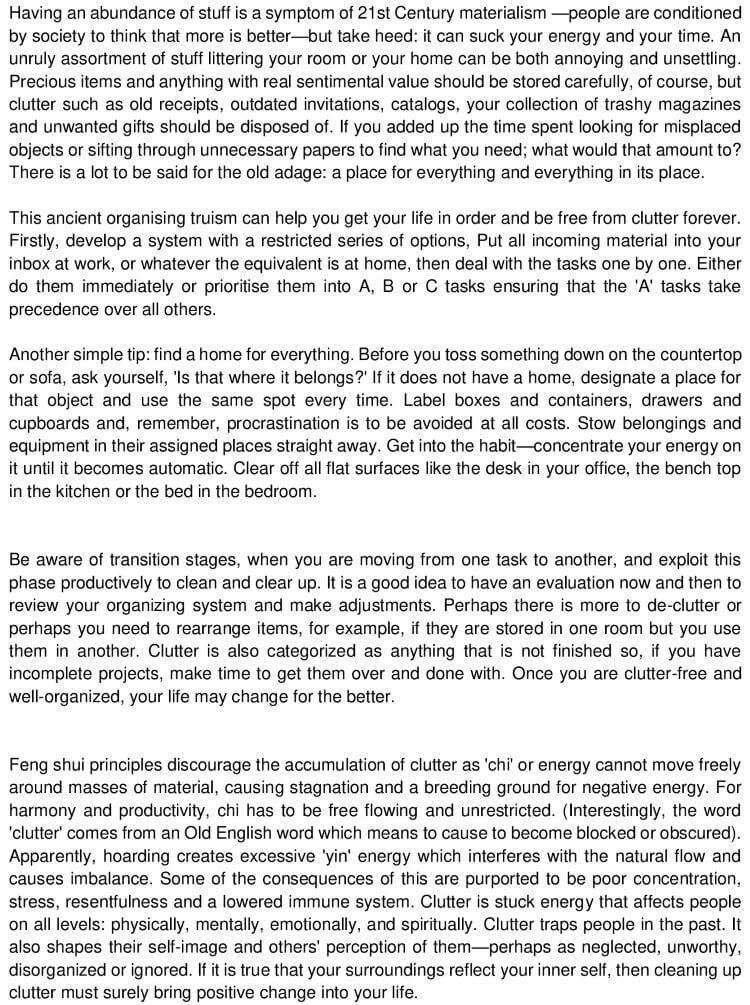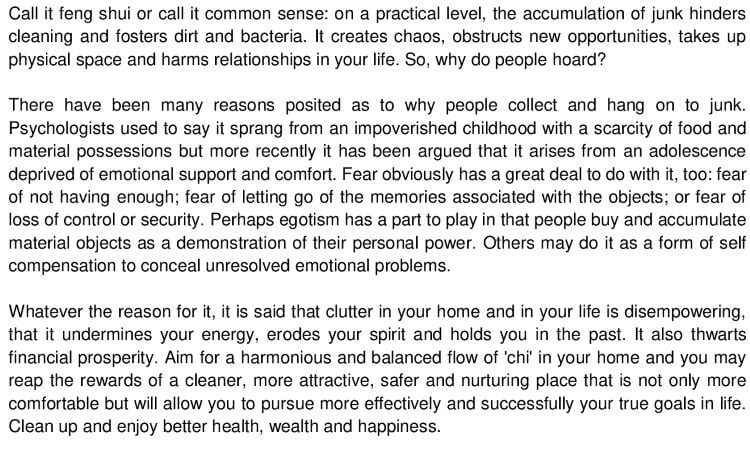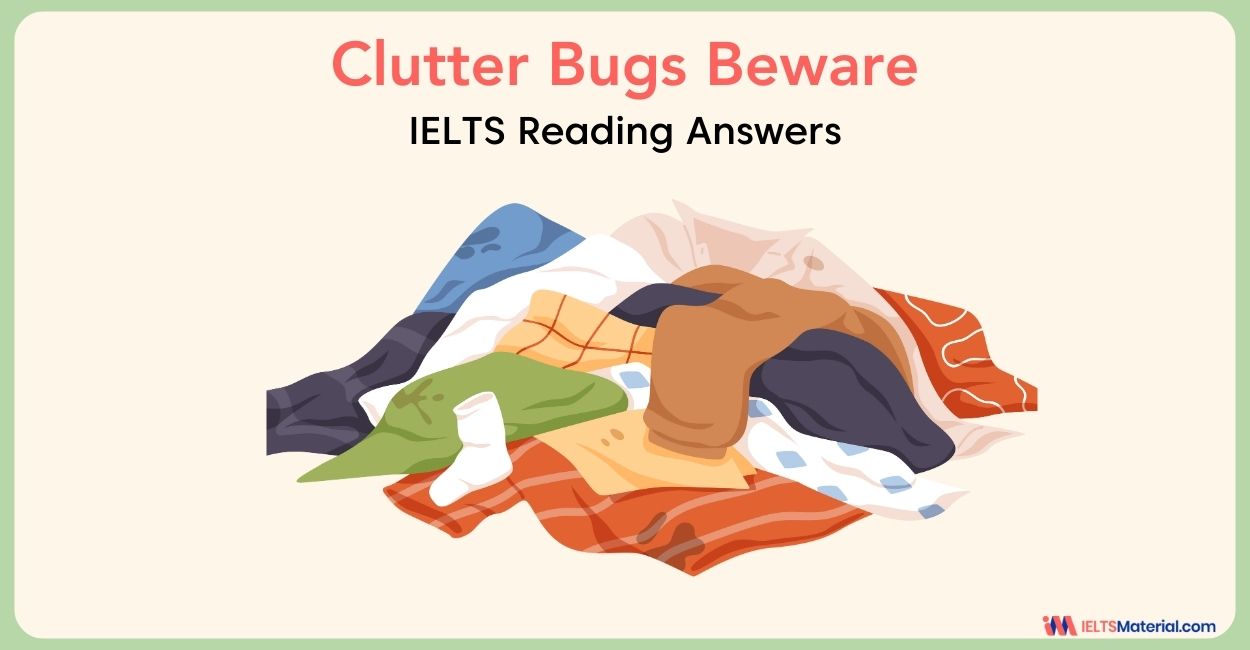Clutter Bugs Beware - IELTS Reading Answers
7 min read
Updated On
-
Copy link
You will find IELTS Reading passage, Clutter Bugs Beware Reading Answers, in this article. Practise this one and you will get an idea of how to deal with IELTS Reading.
Table of Contents

Limited-Time Offer : Access a FREE 10-Day IELTS Study Plan!
Practising IELTS Reading passages, like Clutter Bugs Beware , is the ideal step to master IELTS Reading. But simply solving the questions won’t help.
You have to learn how to scan the given text, highlight keywords using the IELTS Reading keyword techniques and locate the answer within the limited duration of the exam in order to achieve the desired band score in this section. The IELTS Academic reading passage, Clutter Bugs Beware, with 13 questions, provides you that golden opportunity. Also, if you are interested in familiarizing yourself with all the question types, don’t hesitate to take an IELTS reading practice test.
The question types found in the IELTS Reading Answers of Clutter Bugs Beware are:
- IELTS Reading Yes, No, Not Given (Q. 1-5)
- IELTS Reading Sentence Completion (Q. 6-8)
- IELTS Reading Summary Completion (Q. 9-13)
Reading Passage
You should spend about 20 minutes on Questions 1-13, which are based on Reading Passage 1 below.
Clutter Bugs Beware


Questions 1-5
Do the following statements agree with the claims of the writer in the Reading Passage? In boxes 1-5 on your answer sheet, write
YES- if the statement agrees with the claims of the writer
NO- if the statement contradicts the claims of the writer
NOT GIVEN- if it is impossible to say what the writer thinks about this
1 Anything that causes untidiness in your dwelling should be thrown out.
2 The ancient saying ‘a place for everything and everything in its place’ is a good rule to follow in the 21st Century.
3 Organizing systems should be limited to a set of no more than three options.
4 It is a good idea to identify individual items with tags.
5 Putting off things is a bad habit.
Questions 6-8
Complete the sentences below with words taken from the Reading Passage.
Use NO MORE THAN TWO WORDS for each answer.
Write your answers in boxes 6-8 on your answer sheet.
6 Use ________________ constructively as a time for tidying up.
7 Any management scheme for orderliness will benefit from an occasional__________________.
8 Any unfinished undertaking may also be classified as________________.
Questions 9-13
Complete the summary below with words taken from the Reading Passage.
Use NO MORE THAN TWO WORDS for each answer.
Write your answers in boxes 9-13 on your answer sheet.
Feng shui is concerned with the flow of energy. There are many negative 9 _________________ of unbalanced ‘chi ‘. Amassing a great deal of stuff holds people to the 10 ______________and affects their self image. It is a matter of fact that a build-up of mess creates 11_____________ but on another level it generates 12_______________ People hoard junk for all sorts of reasons—most of them psychological, such as fear, egotism or even as a kind of 13 ________, covering up various issues in their lives that have never been cleared up.
Answers of Clutter Bugs Beware Reading Passage With Location and Explanation
Scroll down for the answers to the IELTS Academic passage, Clutter Bugs Beware, and find out your score.
1 Answer: Yes
Question type: Yes/No/Not Given
Answer location: Paragraph 1, line 5
Answer explanation: The 5th line of the first paragraph states that clutter such as old receipts, outdated invitations, catalogs, your collection of trashy magazines and unwanted gifts should be disposed of. These lines indicate that anything that causes untidiness (clutters) to your place should be discarded or disposed of. Thus, the statement agrees with the information. So, the answer is Yes.
2 Answer: Yes
Question type: Yes/No/Not Given
Answer location: Paragraph 1 last line
Answer explanation: The first paragraph concludes by stating that there is a lot to be said for the old adage: a place for everything and everything in its place. So, it is evident that the old proverbial saying ‘a place for everything and everything in its place’ is a good rule to be followed in the 21st Century. Thus, the answer is Yes.
3 Answer: Not Given
Question type: Yes/No/Not Given
Answer location: Paragraph 2
Answer explanation: The 2nd paragraph states that the traditional way of organizing things can help a person to get their life on track, which can lead them to be free from clutter. However, it is mentioned anywhere in the passage that organising systems should be limited to a set of no more than 3 options. Thus, the answer is Not Given.
4 Answer: Not Given
Question type: Yes/No/Not Given
Answer location: Paragraph 3,line 3
Answer explanation: The 3rd line of 3rd paragraph illustrates, “Label boxes and containers, drawers and cupboards, and remember, procrastination is to be avoided at all costs”. Although these lines state to label the boxes and containers, drawers and cupboards, it’s not mentioned anywhere that it’s a good idea to identify individual items with tags. Thus, the answer is Not Given.
5 Answer: Yes
Question type: Yes/No/Not Given
Answer location: Paragraph 3, line 4
Answer explanation: The 4th line of 3rd paragraph states that procrastination is to be avoided at all costs. Stow belongings and equipment in their assigned places straight away. Get into the habit. Concentrate your energy on it until it becomes automatic. These lines indicate that postponing things or procrastination must be avoided at any costs and that some belongings/ equipment should be packed and stored right away. The writer instructs the readers to get into this habit and concentrate on it till it becomes an automatic habit. Thus, the answer is Yes.
6 Answer: Transition Stages
Question type: Sentence Completion
Answer location: Paragraph 4
Answer explanation: The 4th paragraph illustrates, “Be aware of transition stages, when you are moving from one task to another, and exploit this phase productively to clean and clear up.” We can deduce from these lines that the writer informs the reader to be aware of the transition stages and use this phase (stage) productively to clean and clear up. Thus, the answer is transition stages.
7 Answer: evaluation/ review
Question type: Sentence Completion
Answer location: Paragraph 4, line 2
Answer explanation: The 2nd line of 4th paragraph illustrates that It is a good idea to have an evaluation now and then to review your organising system and make adjustments. These lines indicate that it’s a good idea for an individual to evaluate and to review their organising system and make appropriate changes. Thus, any management scheme for orderliness will benefit from an occasional evaluation. So, the answer is evaluation/ review.
8 Answer: clutter
Question type: Sentence Completion
Answer location: Paragraph 4, line 5
Answer explanation: The 5th line of 4th paragraph reveals that clutter is also organized as anything that is not finished so. Therefore, clutter can also be defined as any unfinished undertaking. So, the answer is clutter.
9 Answer: consequences
Question type: Summary Completion
Answer location: Paragraph 5, line 6
Answer explanation: The 6th line of 5th paragraph states that some of the consequences are purported to be poor concentration, stress resentfulness, and a lowered immune system. We can deduce from these lines that Feng Shui is concerned with the flow of energy, which its consequences are alleged to be poor concentration, stress resentfulness, and a lowered immune system. Thus, the answer is consequences.
10 Answer: past
Question type: Summary Completion
Answer location: Paragraph 5,line 9
Answer explanation: The 9th line of 5th paragraph reveals that clutter traps people in the past. It alsp shapesntheir self-image and pthers’ perception of them. These lines indicate that some of the things hold great memories as a result of which it traps people in the past and affects their self-image. So, the answer is Past.
11 Answer: dirt/ bacteria
Question type: Summary Completion
Answer location: Paragraph 6
Answer explanation: The 6th paragraph illustrates, “Call it feng shui or call it common sense: on a practical level, the accumulation of junk hinders cleaning and fosters dirt and bacteria.” We can deduce from these lines that the collection of junk impedes cleaning and generates dirt and bacteria. Thus, it is evident that a buildup of mess creates dirt and bacteria. So, the answer is dirt and bacteria.
12 Answer: chaos
Question type: Summary Completion
Answer location: Paragraph 6, line 2
Answer explanation: Paragraph 6 reveals the fact that the accumulation of junk hinders cleaning and creates dirt and bacteria. In the 2nd line, it is mentioned that it also creates chaos, obstructs new opportunities, takes up physical space and harms relationships. Therefore, apart from generating bacteria and dirt, it also creates chaos. So, the answer is chaos.
13 Answer: self compensation
Question type: Summary Completion
Answer location: Paragraph 7, last line
Answer explanation: We find reference in the last line of paragraph 7, which states that others may do it as a form of self compensation to conceal unresolved emotional problems. Paragraph 7 illustrates how people hoard junk for all sorts of reasons, most of them psychological, such as fear, egotism or even as a kind of self-compensation to cover up multiple issues in their lives that have never been cleared up. Thus, the answer is self-compensation.
Check More IELTS Reading Answers
Practice IELTS Reading based on question types

Start Preparing for IELTS: Get Your 10-Day Study Plan Today!
Recent Articles

Nehasri Ravishenbagam

Haniya Yashfeen

Haniya Yashfeen

Haniya Yashfeen




Post your Comments